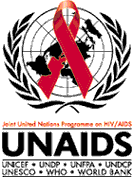

Aids in Kenya: A social disease
From: BBC Online

We always appear helpless when disaster first strikes. The 1998 embassy bomb blast, which resulted in a massive destruction of property and loss of lives, exposed how vulnerable and unprepared we were in dealing with disaster.
When someone dies of Aids, too often we painfully accept such a tragic event as being either an act of witchcraft or an act of God.
And Aids prevention is a foreign language to young women and men in some parts of Kenya. According to a recent study conducted by the National Aids STD Control Programme (NASCOP), 33.3% of girls aged between 15 and 19 years in the western city of Kisumu were HIV positive.
Prostitution
Part of this is due to prostitution. Poverty makes young girls drop out of school and run to the city to work as child minders, where most of them earn between $10 and $15 a month.
Because this money is not enough to provide for her family at home, the girl is driven to prostitution at an early age where she thinks she can earn more money daily.
As Kisumu is a tourist area at the shores of Lake Victoria, girls can find customers day and night - receiving only 50 shillings (less than $1) for each transaction.
Wife inheritance
Wife inheritance - where a widow becomes the property of her late husband's brother - also contributes to the spread of HIV.
After the death of a breadwinner, the widow cannot provide adequate care, food, clothing and above all school fees, so many women see wife inheritance as a solution to financial constraints.
A woman who does not agree to being "inherited" is barred from entering her husband's family homestead. If she dies, her brothers in law are barred by custom from digging her graves.
Male domination
In this male-dominated society, a woman is not expected to participate in important decisions. A woman is considered to have no right even to ask a man to wear a condom, and when it comes to sex it her duty is to oblige. She is used as a sex object, and expected to suffer in silence.
Even when men know the importance of taking precautions, they often cannot afford them. A packet of condoms costs almost the same as half a loaf of bread.
So what should we do?
- Wife inheritance should be shunned once and for all. It is a custom without meaning, especially in the era of Aids. Church members should come forward and strongly discourage this act.
- The government should set money aside to educate people on how to prevent this killer disease and give free condoms to all hospitals and health centres both in rural and urban areas.
- There should be educational programmes on all radio and TV stations about the prevention of Aids. People should not feel ashamed when buying condoms from supermarkets or chemists.
- Sex education should also be taught in school, especially since teenagers are now among those worst affected by Aids. Parents should also take change by letting their children know about this killer disease, even before they become sexually active.
- When politicians organise their political gatherings they should openly talk about this big disease with a small name and distribute condoms to the participants. Aids is now here with us.
Esther Muoso is a journalist and television presenter with the Kenya Broadcasting Corporation
All rights reserved. Copyright BBC NEWS ONLINE.

